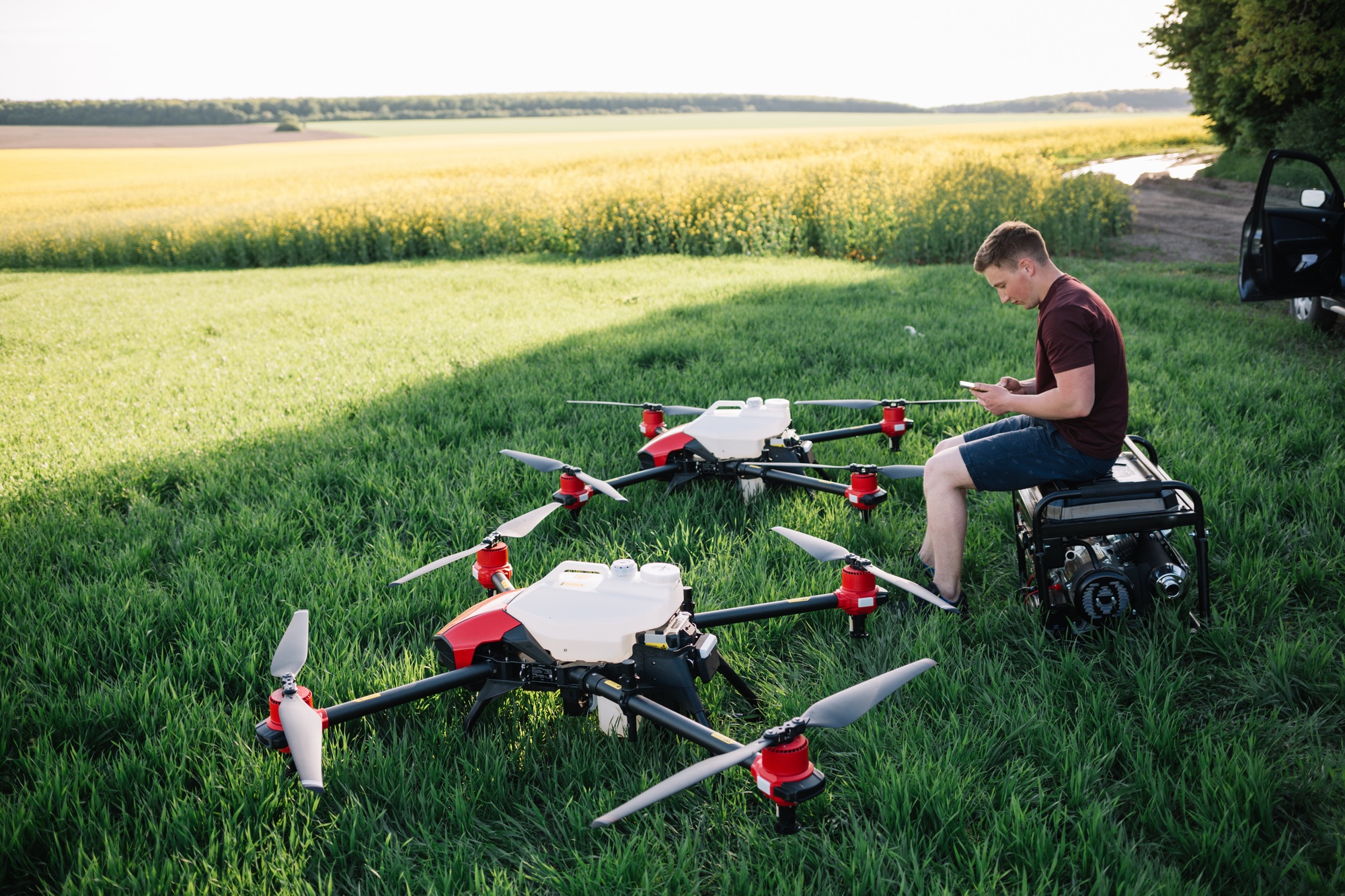Key Takeaways

- Understand the Drone Market: The drone industry is rapidly growing, with an expected market value of $41.3 billion by 2027, driven by sectors like construction and agriculture.
- Identify Your Niche: Focus on a specific service area such as aerial photography, agricultural monitoring, or infrastructure inspection to differentiate your business and cater to client needs.
- Build a Comprehensive Business Plan: Include essential elements like market analysis, marketing strategy, and financial projections to guide your drone business and attract potential investors.
- Adhere to Legal Requirements: Obtain the necessary FAA licenses, register your drones, and ensure compliance with regulations to legally operate your drone business.
- Invest in the Right Equipment: Choose drones and accessories based on the services you provide, ensuring they meet quality and operational requirements for your chosen niche.
- Implement Effective Marketing Strategies: Build your brand, utilize SEO, and engage in targeted advertising through social media and local partnerships to attract and retain customers.
Drones are taking the world by storm, and starting a drone business can be a thrilling venture. With applications ranging from aerial photography to agricultural monitoring, the potential for growth is immense. If you’ve ever dreamed of turning your passion for flying into a profitable business, now’s the perfect time to dive in.
Navigating the drone industry may seem daunting, but with the right guidance, you can set yourself up for success. Understanding the market, obtaining necessary licenses, and mastering the technology are just a few steps to get you airborne. Whether you’re a tech enthusiast or a budding entrepreneur, this guide will help you launch your drone business and soar above the competition.
Understanding the Drone Industry

The drone industry offers vast opportunities for small businesses and startups. Understanding this landscape is crucial for launching a successful venture in drone services.
Market Trends
Market trends indicate rapid growth in the drone industry. According to a 2023 report by Fortune Business Insights, the global drone market is projected to reach $41.3 billion by 2027, expanding at a compound annual growth rate (CAGR) of 20.5%. Increased demand originates from sectors like construction, agriculture, and aerial photography. Monitoring these trends helps you identify lucrative niches and tailor your services accordingly.
Types of Drone Services
Various drone services cater to different industries. Consider the following options:
- Aerial Photography and Videography: Capture stunning images and videos for real estate, events, and marketing campaigns.
- Agricultural Monitoring: Utilize drones for crop health assessments, soil analysis, and precision farming techniques.
- Surveying and Mapping: Offer land surveying services using drones for topographical maps, construction sites, and infrastructure assessments.
- Inspection Services: Provide inspection services for power lines, bridges, and roofs, enhancing safety and reducing costs.
- Delivery Services: Explore opportunities in logistics for drone deliveries in urban areas and remote locations.
Each service category represents a unique aspect of the drone market, enabling you to find your niche and establish a solid foundation for your small business.
Planning Your Drone Business

Planning is vital for launching a successful drone business. Carefully considering your approach sets a strong foundation for your startup in the rapidly evolving drone industry.
Defining Your Niche
Defining your niche helps you tailor your services and target your marketing efforts effectively. Identify which area of the drone industry aligns with your skills and local demand. Popular niches include:
- Aerial Photography: Cater to clients in real estate, events, or tourism.
- Agricultural Monitoring: Offer precision farming solutions, including crop analysis and health assessments.
- Infrastructure Inspection: Provide inspection services for utilities, construction sites, and transportation networks.
- Surveying and Mapping: Deliver enhanced data collection for land surveys, mining, and environmental assessments.
By focusing on a specific niche, you can meet particular client needs and stand out in a competitive marketplace.
Creating a Business Plan
Creating a business plan is essential for guiding your drone startup. Your business plan should include:
- Executive Summary: Outline your business goals and a brief overview of your services.
- Market Analysis: Present your market research findings, including target demographics and competitive landscape.
- Marketing Strategy: Detail how you’ll promote your services, including online marketing and partnerships.
- Financial Projections: Include startup costs, revenue projections, and funding sources to showcase financial viability.
A well-structured business plan acts as a roadmap for achieving success and securing potential investments as you start your small business in the drone industry.
Legal Considerations

Starting a drone business involves navigating essential legal aspects to ensure compliance and operational success. Understanding regulations, licensing, and insurance requirements is critical for your startup.
Licensing and Regulations
To operate a drone commercially, you must adhere to FAA Part 107 regulations. You’ll need to obtain a Remote Pilot Certificate by passing an aeronautical knowledge test. Drones weighing between 0.55 and 55 pounds require registration with the FAA. Operational rules mandate flying below 400 feet, maintaining a visual line of sight, avoiding flights over people or moving vehicles, and conducting operations only during daylight hours or civil twilight with necessary lighting. Familiarizing yourself with these requirements is vital when learning how to start a business in this field.
Insurance Requirements
Obtaining insurance coverage is crucial for protecting your drone business from liabilities. Commercial drone insurance typically includes coverage for general liability, property damage, and loss of equipment. Considering the potential risks involved in drone operations, it’s advisable to consult with insurance professionals who specialize in small business policies to tailor coverage to your specific needs. This proactive approach helps safeguard your investment and enhances credibility in the market.
Equipment and Technology

Selecting the right equipment and technology is crucial when you start a drone business. Drones and accessories vary greatly based on your service offerings, so assessing your needs helps ensure success.
Choosing the Right Drones
Choosing the right drones depends on the specific services you plan to offer. For instance:
- Aerial Photography and Videography: You need drones with high-resolution cameras, such as the DJI Phantom 4 Pro or Autel EVO II. These models deliver excellent image quality crucial for captivating visuals.
- Surveying and Mapping: Specialized drones equipped with high-quality zoom cameras or thermal sensors are necessary for accurate data collection. Equipment like the senseFly eBee X supports mapping for construction or agricultural monitoring efficiently.
- Infrastructure Inspection: Drones with superior cameras and thermal imaging capabilities are essential for inspecting bridges, power lines, and cell towers. Models such as the DJI Mavic 2 Enterprise offer multifunctionality to cater to these needs.
Essential Accessories
In addition to drones, various accessories enhance operational efficiency:
- Batteries: High-capacity batteries extend flight time, allowing for uninterrupted service. Invest in multiple batteries to minimize downtime between flights.
- Extra Propellers: Keeping spare propellers on hand helps mitigate risks associated with damage during flights. For optimal performance, choose compatible propeller sets suited to your drone model.
- Carrying Cases: Durable carrying cases ensure safe transport of drones and accessories. Select cases with padding to protect equipment from external impacts.
- Software: Utilizing software for flight planning and data analysis streamlines your workflows. Programs like Pix4D and DroneDeploy enhance mapping and surveying capabilities.
Assessing your needs and investing in the right drones and accessories lays a solid foundation for your small business in the drone industry.
Marketing Your Drone Business
Effective marketing strategies elevate your drone business in a competitive market. Focus on building your brand and acquiring customers to drive growth.
Building Your Brand
Establishing a strong brand creates recognition and trust among potential clients. Create a professional logo and consistent branding across all platforms, including your website, social media, and marketing materials. Showcase your unique services, such as aerial photography or agricultural monitoring, effectively to stand out. Share customer testimonials and case studies to reinforce your credibility. Consider engaging in local events or collaborations to enhance visibility. Your brand identity should resonate with your target audience, reflecting your commitment to quality and innovation.
Strategies for Customer Acquisition
Implement targeted marketing strategies to attract customers with high buying intent. Use location-specific keywords in your website content to optimize for search engines. Consider running Google Ads or Facebook ads that target specific demographics interested in drone services. Leverage social media platforms to share captivating content, including videos of your drone work or behind-the-scenes footage. Establish strategic partnerships with local businesses, such as real estate agencies or agricultural firms, to reach new clients. Focus on creating valuable content for your audience, like blogs or guides, that address their needs and interests related to drone usage.
Conclusion
Starting a drone business is a thrilling venture filled with potential. By understanding the market and honing your skills, you can carve out a niche that aligns with your passions. Remember to plan meticulously and comply with legal requirements to ensure a smooth launch.
Investing in the right equipment and marketing strategies will set you apart in a competitive landscape. With the drone industry projected to grow significantly, now’s the perfect time to take action. Embrace the journey ahead and watch your entrepreneurial dreams take flight.
Frequently Asked Questions
What are the main applications of drones in a business?
Drones are used in various fields, including aerial photography, agricultural monitoring, construction, surveying, mapping, and inspection services. Each application offers unique opportunities for entrepreneurs to explore and establish a successful business.
How fast is the drone market expected to grow?
The global drone market is projected to reach $41.3 billion by 2027, showcasing rapid growth driven by increased demand in sectors like construction, agriculture, and aerial photography.
What licenses do I need to start a drone business?
To operate a drone business commercially, you must obtain a Remote Pilot Certificate from the FAA and register your drones. Compliance with FAA regulations is essential to avoid legal issues.
How do I create a successful business plan for my drone business?
A successful business plan includes an executive summary, market analysis, marketing strategy, and financial projections. Defining a niche that aligns with your skills and local demand is critical for establishing a solid foundation.
What kind of insurance do I need for my drone business?
A drone business should have liability insurance to protect against potential damages or accidents. It’s advisable to consult with insurance professionals to tailor coverage based on specific operational needs.
How do I choose the right equipment for my drone business?
Selecting the right equipment depends on the services you offer. For example, high-resolution camera drones like the DJI Phantom 4 Pro are best for photography, while thermal drones are suitable for surveying. Consider accessories that enhance operation efficiency.
What marketing strategies are effective for a drone business?
Building a strong brand is key, including creating a professional logo and consistent branding. Use location-specific SEO, targeted advertising, social media engagement, and partnerships with local businesses to enhance visibility and attract clients.
Image Via Envato: dotshock, osbmxhouse, oneinchpunchphotos, fentonroma, Gajus-Images



